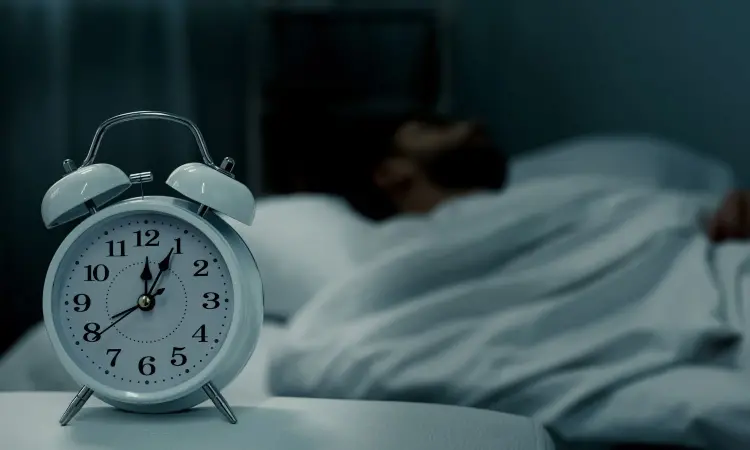- Home
- Medical news & Guidelines
- Anesthesiology
- Cardiology and CTVS
- Critical Care
- Dentistry
- Dermatology
- Diabetes and Endocrinology
- ENT
- Gastroenterology
- Medicine
- Nephrology
- Neurology
- Obstretics-Gynaecology
- Oncology
- Ophthalmology
- Orthopaedics
- Pediatrics-Neonatology
- Psychiatry
- Pulmonology
- Radiology
- Surgery
- Urology
- Laboratory Medicine
- Diet
- Nursing
- Paramedical
- Physiotherapy
- Health news
- Fact Check
- Bone Health Fact Check
- Brain Health Fact Check
- Cancer Related Fact Check
- Child Care Fact Check
- Dental and oral health fact check
- Diabetes and metabolic health fact check
- Diet and Nutrition Fact Check
- Eye and ENT Care Fact Check
- Fitness fact check
- Gut health fact check
- Heart health fact check
- Kidney health fact check
- Medical education fact check
- Men's health fact check
- Respiratory fact check
- Skin and hair care fact check
- Vaccine and Immunization fact check
- Women's health fact check
- AYUSH
- State News
- Andaman and Nicobar Islands
- Andhra Pradesh
- Arunachal Pradesh
- Assam
- Bihar
- Chandigarh
- Chattisgarh
- Dadra and Nagar Haveli
- Daman and Diu
- Delhi
- Goa
- Gujarat
- Haryana
- Himachal Pradesh
- Jammu & Kashmir
- Jharkhand
- Karnataka
- Kerala
- Ladakh
- Lakshadweep
- Madhya Pradesh
- Maharashtra
- Manipur
- Meghalaya
- Mizoram
- Nagaland
- Odisha
- Puducherry
- Punjab
- Rajasthan
- Sikkim
- Tamil Nadu
- Telangana
- Tripura
- Uttar Pradesh
- Uttrakhand
- West Bengal
- Medical Education
- Industry
Sleep insufficiency associated with retinal neurodegeneration and increased risk of glaucoma: Study

A new study published in the American Journal of Ophthalmology showed that the retinal nerve fiber layer (RNFL), a crucial indicator of the health of the optic nerve, thins when people sleep for fewer than 6 hours.
One of the main causes of blindness and severe vision impairment in older persons globally is glaucoma. It is acknowledged as a neurodegenerative illness that has characteristics in common with other neurodegenerative disorders, including irreversible functional deterioration and gradual neuronal death. About 80–90% of all glaucoma cases in North America and Asia are open-angle glaucoma, making it the most prevalent kind of glaucoma.
There is growing recognition of the wide-ranging systemic effects of sleep duration, sleep quality, and clinically diagnosed sleep disorders like insomnia and sleep apnea syndrome (SAS); these factors affect cardiovascular, metabolic, and neurovascular health as well as contribute to neuroinflammatory and neurodegenerative diseases like Alzheimer's disease.
Even while the systemic effects of sleep deprivation are gaining attention, less is known about how it may affect eye health, especially glaucoma. Thus, this study was set to ascertain if adult incidence glaucoma and RNFL thinning are related to inadequate sleep, insomnia, and SAS.
A total of 5,958 people between the ages of 40 and 80 who had optical coherence tomography and wrist actigraphy were part of the regional cohort. The national cohort, which included individuals over 40, included 72,075 patients with sleep apnea syndrome and 985,136 patients with insomnia, as well as corresponding control groups free of both conditions.
Using multivariable linear models, this research performed a cross-sectional study in the regional cohort to evaluate the relationship between objectively observed sleep characteristics and retinal nerve fiber layer (RNFL) thickness. They used Cox proportional hazards models to estimate adjusted hazard ratios (aHR) for incident glaucoma in a longitudinal study of the countrywide population with up to 7.5 years of follow-up.
After controlling for age, sex, intraocular pressure, and systemic variables, sleeping less than six hours was still independently linked to thinner RNFL in the regional cohort. RNFL thickness peaked at six to seven hours of real sleep and decreased with shorter duration.
The patients with insomnia (aHR 1.30, 95% CI 1.28–1.32) and SAS (aHR 1.43, 95% CI 1.35–1.51) had a greater incidence of glaucoma than controls in the countrywide group. Overall, clinically recognized sleep problems and objective sleep insufficiency are associated with retinal neurodegeneration and increase the risk of glaucoma development.
Source:
Akada, M., Nakanishi, Y., Ideyama, M., Mori, Y., Morino, K., Nakano, E., Numa, S., Nagasaki, T., Matsumoto, T., Sunadome, H., Hamada, S., Takahashi, N., Hirai, T., Komenami, N., Chin, K., Murase, K., Sato, S., Tabara, Y., Matsuda, F., … Hata, M. (2025). Sleep disturbance as a risk factor for retinal neurodegeneration and subsequent glaucoma. American Journal of Ophthalmology. https://doi.org/10.1016/j.ajo.2025.08.019
Neuroscience Masters graduate
Jacinthlyn Sylvia, a Neuroscience Master's graduate from Chennai has worked extensively in deciphering the neurobiology of cognition and motor control in aging. She also has spread-out exposure to Neurosurgery from her Bachelor’s. She is currently involved in active Neuro-Oncology research. She is an upcoming neuroscientist with a fiery passion for writing. Her news cover at Medical Dialogues feature recent discoveries and updates from the healthcare and biomedical research fields. She can be reached at editorial@medicaldialogues.in
Dr Kamal Kant Kohli-MBBS, DTCD- a chest specialist with more than 30 years of practice and a flair for writing clinical articles, Dr Kamal Kant Kohli joined Medical Dialogues as a Chief Editor of Medical News. Besides writing articles, as an editor, he proofreads and verifies all the medical content published on Medical Dialogues including those coming from journals, studies,medical conferences,guidelines etc. Email: drkohli@medicaldialogues.in. Contact no. 011-43720751


